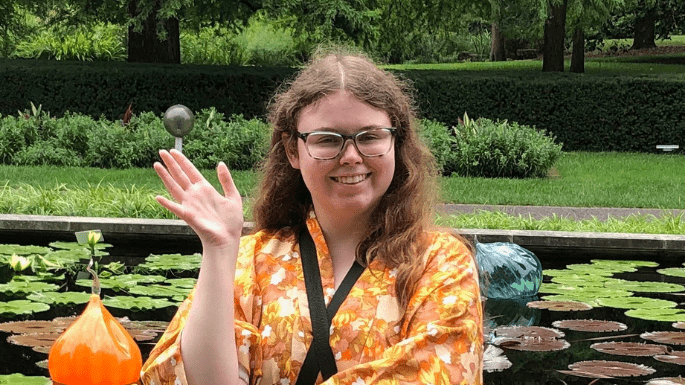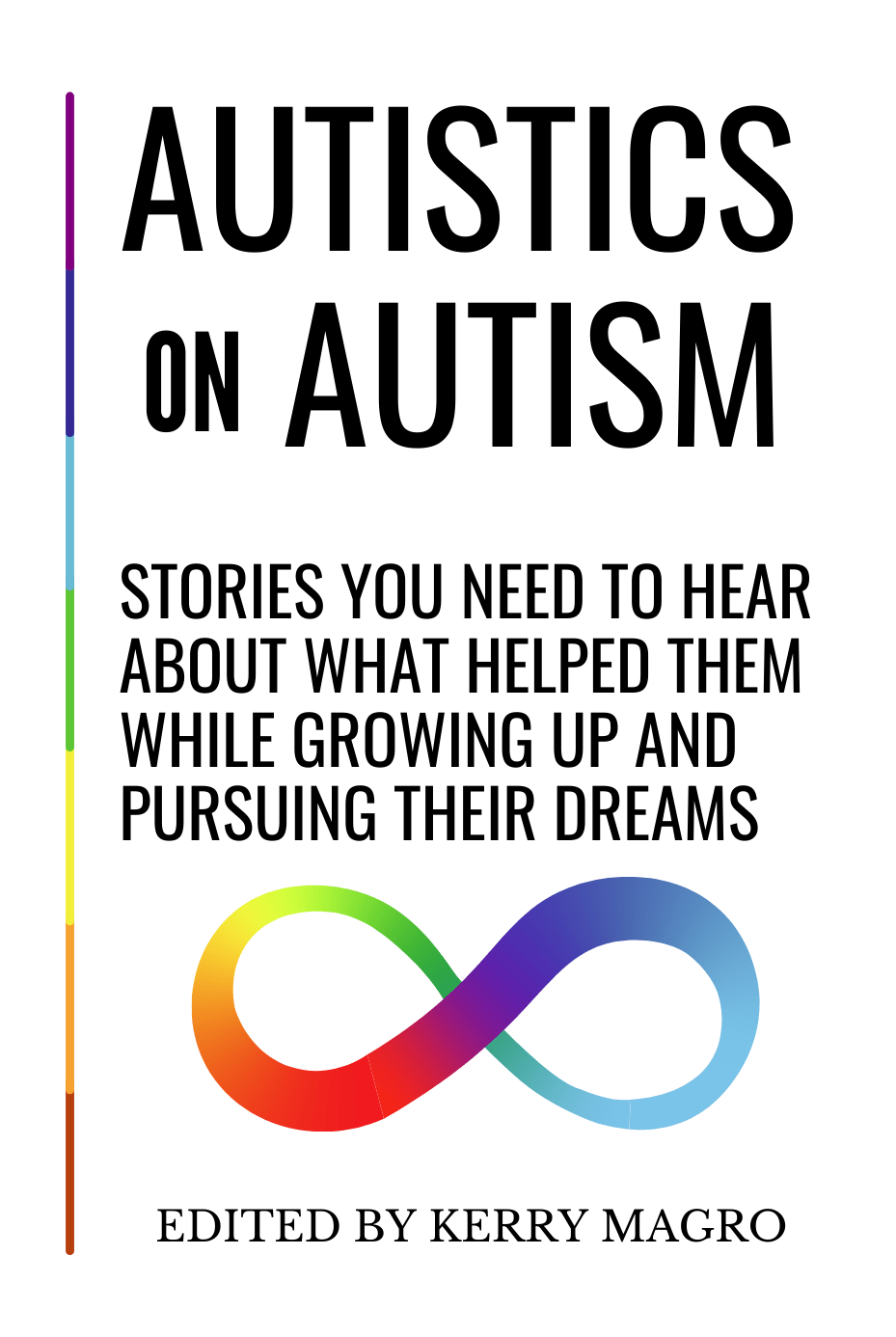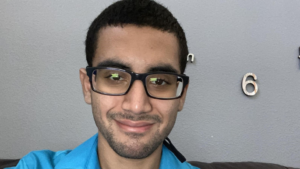This guest post is by Faith Zuber, a young woman on the autism spectrum who was diagnosed with autism before 10 years of age and attends University of Missouri St. Louis. Faith is applying for the Spring 2023 Making a Difference Autism Scholarship via the nonprofit KFM Making a Difference started by me, Kerry Magro. I was nonverbal till 2.5 and diagnosed with autism at 4, and you can read more about my organization here. Autistics on Autism: Stories You Need to Hear About What Helped Them While Growing Up and Pursuing Their Dreams, our nonprofit’s new book, was released on March 29, 2022, on Amazon here for our community to enjoy featuring the stories of 100 autistic adults.
Some people see autistic people as strange. We wear our hearts on our sleeves, and we struggle to read in between the lines. We get super excited about specific topics, and then have no interest in most others. I used to talk about nothing but Pokemon. Our sensory responses can lead to obsessions about textures or avoidance from them. For instance, I would stay in the cafeteria all by myself because I couldn’t take how loud the high school assemblies were, and I’d pinch my nose and try not to breathe anytime someone used hand sanitizer or any artificial smell. Sensations we don’t like make us more irritable, potentially even leading to fits from overwhelming stimulation. We also have little repetitive behaviors, like saying the same thing over and over again or having the same scripted response. I, for example, bundled all the goodbyes into one fast-paced “Goodbye, bye-bye, see you later, love you, have a great awesome day.” These kinds of things can cause rifts in relationships, even within the family, or other people may intentionally or unintentionally provoke us simply because of these behaviors. My obvious aversion to hand sanitizer led some of my fellow students to use hand sanitizer just to bother me.
But I see autism as a positive. We’re honest – maybe a little too honest sometimes, but personally, I’d prefer people tell me like it is rather than trying so hard to figure out whether or not someone means what they say. Generally, you don’t have to worry about an autistic individual lying to you or hiding anything from you; we’re genuine, whether we’re trying to give a compliment, criticism, or just a state of fact.
We follow rules, too, and otherwise seek fairness because we like stability – we might get upset when someone else doesn’t do the same, even to the point of having a meltdown in front of our classmates and teachers, but rules are there to protect us and secure integrity and consistency. We can just be a bit intense about enforcing those rules. And if rules are changed so that they can better fulfill that purpose, we may have trouble adjusting, but we can get there. Our minds aren’t frozen in time, nor are our hearts. It just takes us a little bit longer to get used to changes, but as children, we may also absorb changes in society easier, as we take things at face-value and thus may not adopt any underlying feelings about the changes that occurred before we were born. These days, with divisiveness and destructiveness taking the world by storm, seeking fairness seems all the more important.
As part of liking consistency, which goes along with honesty and fairness, we’re also loyal and dedicated. Even if this can be seen as a bad thing, too – if we’re loyal to someone who doesn’t deserve it – we usually like to help people, especially those we care about. Thus, we can help our undeserving loved ones to grow into someone who’s better, someone who deserves not only our love but others’ as well. Because someone has to reach out to help someone out of a pit. And we all find ourselves in some pits sometimes, so I think it’s more of a positive, that we can continue to be by someone’s side even after poor decisions.
We’re even talented. In that specific area that we absolutely adore, there aren’t many better than us. We suck up knowledge about our interests as if that is our hydration, and we practice anything that may be involved with them. For example, creative outlets – especially writing – are my obsessions and hobbies, so from absorbing information about grammar and stories and from writing lots, my writing improved exponentially throughout high school. This means that we become extremely useful to the fields we love, so that we can acquire a career that we enjoy and can contribute to. Most people have to choose between something they’re good at and something they enjoy, but for autistic people, they usually coincide, which enables us to find happiness in our career and in life, which not a lot of people acquire.
When it comes to approaching problems with our hearts versus our brains, we tend to be good at taking an objective look at things. It may be hard for us to connect with others and identify and understand their feelings, but we make up for it by doing our best to come up with ways to fix the problem, or at least being there for our loved ones because we’re devoted. Even if we can’t fully comprehend how much they’re struggling, we get frustrated at not being able to fix their problem, and I think when they see that, they understand that we care.
To have autism doesn’t mean that there’s something that needs to be fixed about us. It just means we’re different. And that means that rather than just us adjusting to normalcy, other people should meet us in the middle – that everyone should learn social skills. While we learn to read body language and adjust to changes, others should learn to understand our language – rocking to make us comfortable, the autistic tone of excitement (which sounds a lot like sarcasm), or even saying someone looks like a “present” as a compliment – although verbal communication is always a way to get it across if necessary.
I love being different and thrive as an individual with autism, and you can, too!
Follow my journey on Facebook, my Facebook Fan Page, Tiktok, Youtube & Instagram.
My name is Kerry Magro, a professional speaker and best-selling author who is also on the autism spectrum. I started the nonprofit KFM Making a Difference in 2011 to help students with autism receive scholarship aid to pursue post-secondary education. Help support me so I can continue to help students with autism go to college by making a tax-deductible donation to our nonprofit here.
Autistics on Autism: Stories You Need to Hear About What Helped Them While Growing Up and Pursuing Their Dreams was released on March 29, 2022 on Amazon here for our community to enjoy featuring the stories of 100 autistic adults. 100% of the proceeds from this book will go back to our nonprofit to support initiatives like our autism scholarship program. In addition, this autistic adult’s essay you just read will be featured in a future volume of this book as we plan on making this into a series of books on autistic adults.















